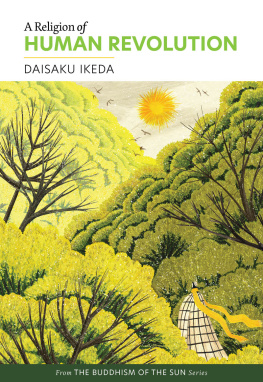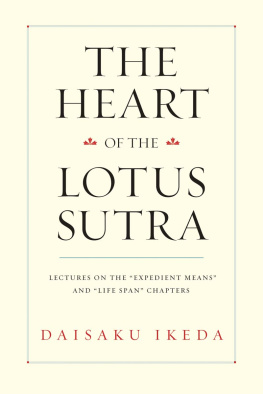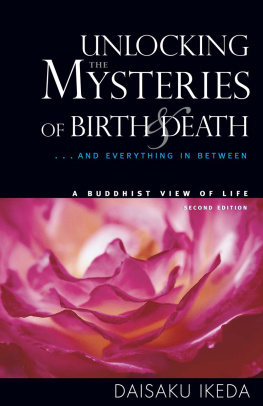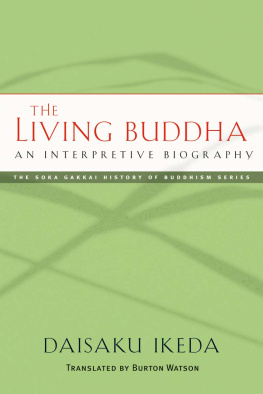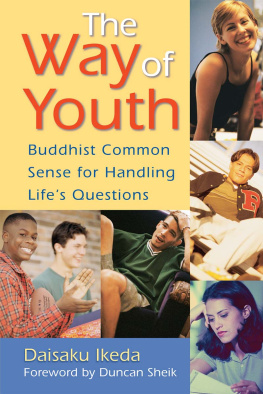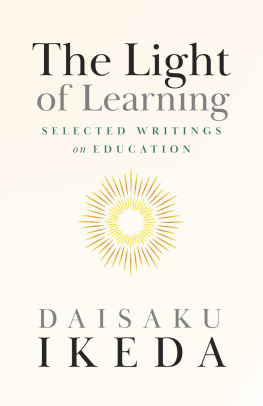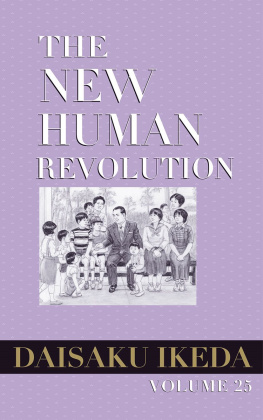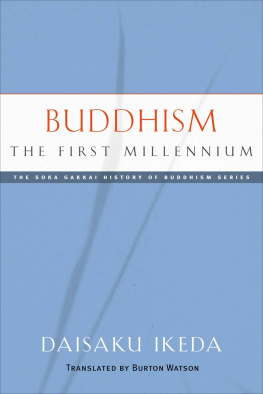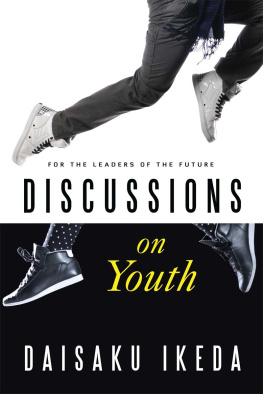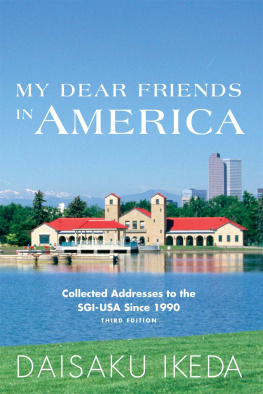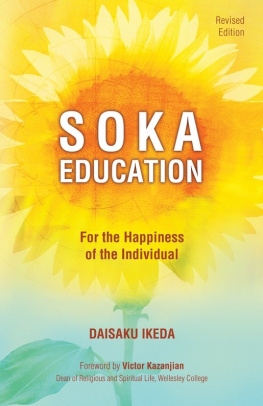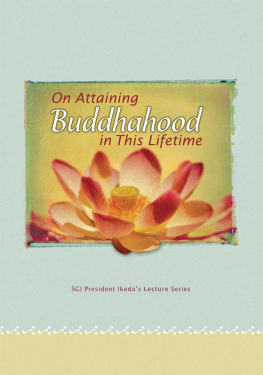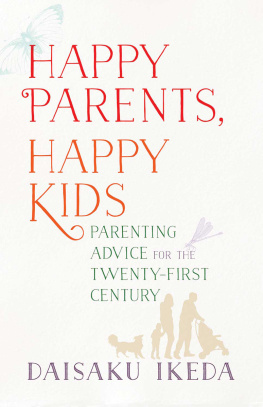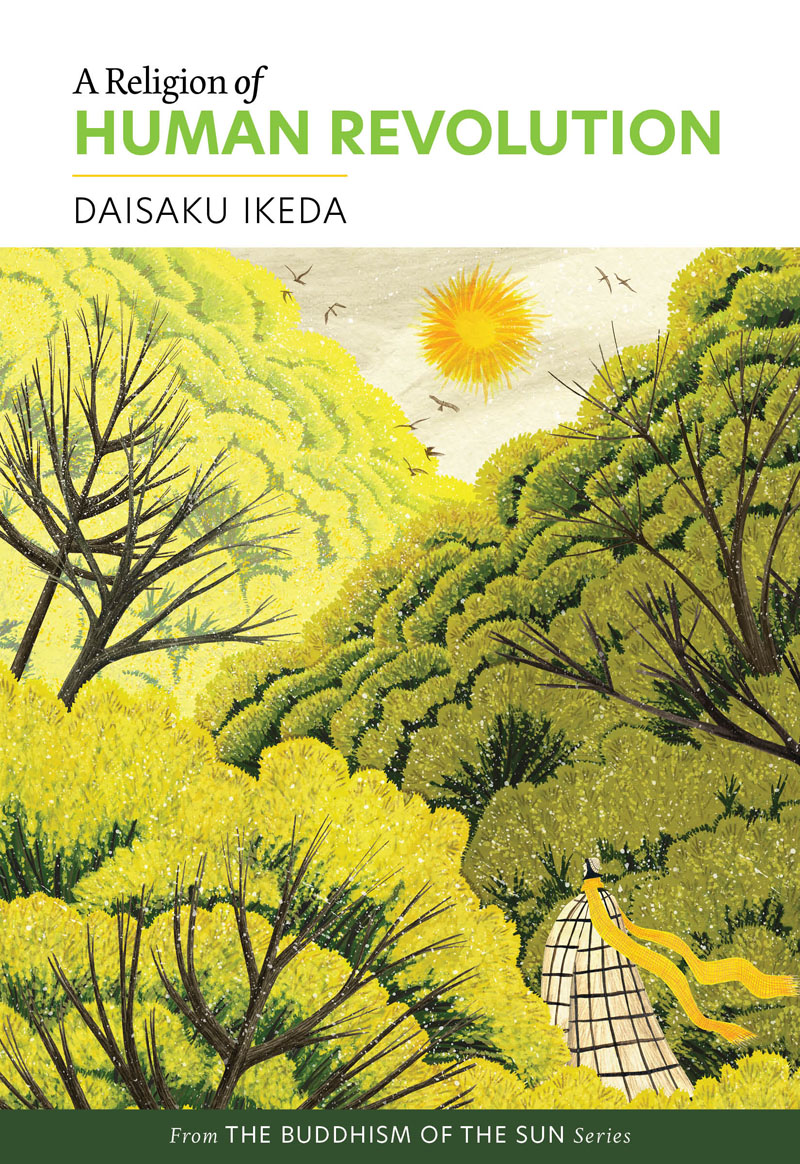

Published by World Tribune Press
A division of the SGI-USA
606 Wilshire Blvd.
Santa Monica, CA 90401
2021 Soka Gakkai
All rights reserved.
Printed in the United States of America.
Cover illustration by Rosanna Tasker.
Cover and interior design by Jocelyn Hsu.
25 24 23 22 21 1 2 3 4 5
ISBN: 978-1-944604-54-7
Library of Congress Control Number: 2021942957
Contents
EDITORS NOTE
A Religion of Human Revolution is a collection of essays by SGI President Ikeda in his series titled The Buddhism of the SunIlluminating the World. These essays were published in Living Buddhism from October 2017 to September 2018.
The citations most commonly used in this book have been abbreviated as follows:
GZ, page number (s) refers to the Gosho zenshu, the Japanese-language compilation of letters, treatises, essays, and oral teachings of Nichiren Daishonin.
LSOC, page number(s) refers to The Lotus Sutra and Its Opening and Closing Sutras, translated by Burton Watson (Tokyo: Soka Gakkai, 2009).
OTT, page number(s) refers to The Record of the Orally Transmitted Teachings, translated by Burton Watson (Tokyo: Soka Gakkai, 2004).
WND, page number(s) refers to The Writings of Nichiren Daishonin, vol. 1 (WND-1) (Tokyo: Soka Gakkai, 1999) and vol. 2 (WND-2) (Tokyo: Soka Gakkai, 2006).

Chapter
1
The Heart of a Lion King
Creating a Current of Victory for All People
The Greek philosopher Heraclitus (c. 540480 BCE) famously declared, The sun is new every day.
At the dawn of worldwide kosen-rufu, lets set forth with hope and optimism, with a new days sun shining in our hearts.
Now in the latter half of the second decade of the twenty-first century, the world appears increasingly troubled, with dark clouds looming on the horizon.
On the one hand, globalization is moving forward on multiple fronts, including business, finance, transportation, and communications. On the other hand, economic disparities are growing, conflict and civil strife continue unabated in many places, and there seems to be a resurgence of divisiveness and hostility in peoples hearts. Such developments have created large numbers of refugees, whose precious lives are being disrespected and threatened.
Environmental degradation is also a serious issue.
The problems confronting human society cannot be solved solely by external changes such as political and economic reforms or institutional and organizational innovation. Reform efforts that fail to consider peoples well-being, or that lack respect for the dignity of life, will only create more problems and eventually run aground.
Therefore, we must remember that the fundamental goal is peoples happiness.
Stay connected to the people! Awaken to the dignity and preciousness of life! Change must start with people themselves! Now is the time for humanity to return to these basic points.
Given all of this, what should be the central guiding principles of religion in the twenty-first century? I assert that they are humanism and human revolution.
Self-Transformation Is the Starting Point of the Soka Gakkai
L ooking back, a few years after he founded the Soka Kyoiku Gakkai (Value-Creating Education Society; forerunner of the Soka Gakkai) in 1930, first president Tsunesaburo Makiguchi discussed the subject of social change: In the final analysis, unless the human spirit is fundamentally transformed through a religious revolution, the chaos in human affairs will never be remedied. The fundamental transformation of the human spirit of which he speaks here is none other than human revolution.
Second Soka Gakkai president Josei Toda, who carried on Mr. Makiguchis vision, was imprisoned with his mentor as a result of religious oppression by the wartime militarist government. While in detention, Mr. Toda awakened to the realization that the Buddha is life itself and that he was a Bodhisattva of the Earth. After his release (in July 1945), he sought to teach people how to transform their lives through faith in the Mystic Law. With the aim of elevating the life state of all humanity to Buddhahood, to their highest level of character, he set out to achieve kosen-rufu. His wish was to free people from suffering, including that caused by war, hunger, and sickness.
Mr. Toda agreed so heartily with University of Tokyo president Shigeru Nambara when the latter stressed, shortly after the end of World War II, the need for a human revolution. Such a revolution, Nambara said, was vital if the peoples welfare was truly to be served by the political and social reforms and the so-called second industrial revolution taking place amid the turbulent changes of the postwar era.
Mr. Toda clearly saw that a fundamental transformation in the depths of peoples lives was necessary if they were to realize happiness, social prosperity, and world peace. He showed how we could make this possible on a fundamental level through practicing Nichiren Buddhism and achieving human revolution within the reality of our lives and society.
Religious Revolution Is Itself Human Revolution
W hen I was twenty, I attended a lecture by Mr. Toda on the Lotus Sutra and was deeply moved by his great vision. I was inspired to write down in my notebook: Religious revolution is itself human revolution. It in turn leads to educational revolution and economic revolution, and will also become true political revolution.
Later, as Mr. Todas disciple, completely united with him in spirit, I wrote the novel The Human Revolution as a record of his noble life. I summarized its theme in these words: A great human revolution in just a single individual will help achieve a change in the destiny of a nation and, further, will enable a change in the destiny of all humankind.
This has also been the guiding vision of the mentors and disciples of Soka dedicated to realizing the great vow for kosen-rufu, for world peace.
Nichiren Buddhism is a beacon of human revolution, shining ever more brightly to impart the light of courage and hope to people in todays troubled world.
Human revolution is the transformation of ones life and ones karma. It is the achievement of true happiness and fulfillment. It is the key to actualizing Nichirens ideal of establishing the correct teaching for the peace of the land. It is the foundation for peace.
A Transformative Buddhism for All People
As the [Lotus Sutra] says, hoping to make all persons equal to me, without any distinction between us, you can readily become as noble a Buddha as Shakyamuni. (WND-1, 1030)
M r. Toda took the liberty to expand upon and develop the idea of human revolution in accord with the essential principles of Nichiren Buddhism. His first important step was to explain the aim of Buddhist practiceattaining Buddhahoodas the process of inner transformation, or human revolution, thereby bringing the teaching to life in contemporary society.
Next page
